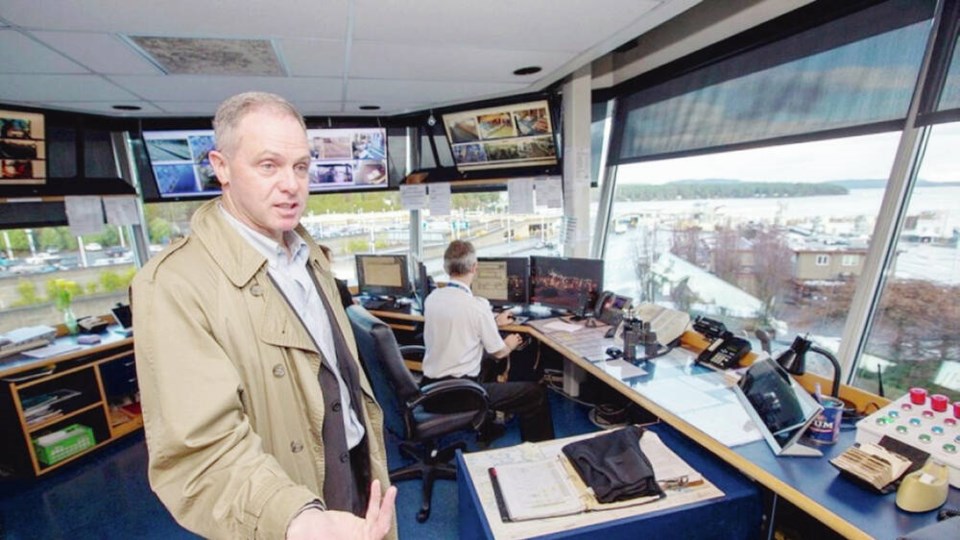B.C. Ferry Services announced Friday it has ended its contract with Mark Collins, who has served since April 2017 as president and chief executive of the company, which operates as B.C. Ferries.
Collins, whose contract had been due to run until 2026, is leaving B.C. Ferries “effective immediately,” a statement from the board said. His departure comes as the system posts frequent sailing-cancellation notices due to crew shortages.
The B.C. Ferry Services board of directors decided to end Collins’ contract, which will entitle him to severance in accordance with the terms of his contract, it said. The amount has not yet been finalized.
“We thank Mr. Collins for his hard work and dedication to B.C. Ferries. We wish him well in all future endeavours,” said board chair Joy MacPhail in a statement. “Like many organizations, B.C. Ferries has faced recent staffing shortages, service interruptions and COVID-related challenges,” she said. “There are no quick fixes to these systemic challenges, but as a board, we believe it is time for renewal, fresh ideas and a renewed commitment to the highest standards of customer service, safety and affordability.”
Collins was appointed with a five-year contract in 2017. In 2020, the board extended the contract until 2026. His remuneration for the fiscal year ending March 31, 2021 included a salary of $488,544. His total compensation including benefits and other obligations was $563,052, B.C. Ferries said in a report.
Collins’ salary in the fiscal year 2021 included a one-time payment of $88,269 for banked vacation time earned from fiscal 2018 through fiscal 2020, the company said.
Under Collins’ leadership, B.C. Ferries invested in upgrading terminals, brought in a new fare-flexibility model, spent millions of dollars to build new ferries, reduced the number of vessel classes and championed measures to make the system environmentally friendlier.
A search for his replacement will soon be underway, B.C. Ferries said. In the meantime, Jill Sharland, current vice-president and chief financial officer, will serve as interim president and chief executive while continuing to fulfil her duties as CFO, the company said.
Eric McNeely, president of the B.C. Ferry and Marine Workers Union, which represents about 4,000 of B.C. Ferries’ approximately 5,000 employees, said he met with Sharland Friday and the two plan to meet again on Tuesday to talk about short- and long-term goals. The union has said it wants to see the company focus more on recruitment, training and retention of employees.
In April 2020, B.C. Ferries infuriated the union when it issued layoff notices to about 1,000 employees after traffic plummeted, costing the company about $1 million every day.
Federal wage subsidies announced shortly afterward saw the company recall the majority of workers. B.C. Ferries was later found by an arbitrator to have breached its contract with employees by imposing the layoffs.
McNeely said he is optimistic about improved relations between the union and management under a new leader. “I think any time you have different eyes looking at a problem, there’s different solutions, or there’s not an entrenched position,” he said. “This is really a moment to re-calibrate this relationship.”
B.C. Liberal Leader Kevin Falcon, however, said he hasn’t seen any real justification for cancelling Collins’ contract.
“I think the public should be very, very concerned that the NDP is now tinkering with B.C. Ferries, appointing NDP supporters to the board,” said Falcon, adding the government is returning to its “1990s playbook where they couldn’t resist interfering with B.C. Ferries and we ended up with the fast-ferries fiasco.”
Falcon said when he was transportation minister in the late 2000s, he had his own disagreements with then-president David Hahn. “But it was important that I did not have the ability to tell him how to do his job.”
B.C. Ferries is facing similar challenges to many other businesses, such as staffing shortages, he said.
David Black, associate professor in communication and culture at Royal Roads University, said the government has reasserted its control over B.C. Ferries. “They are looking for new leadership here.”
Governments like the public to see them as problem-solvers, which means leadership changes can have both political and practical value, Black said.
Walt Judas, chief executive of the Tourism Industry Association of B.C., said the group is sorry to see Collins go, adding he was a strong supporter of the province’s tourism industry.
“Mark provided visionary and steady leadership during his tenure, and built important partnerships with business, communities, First Nations, and sector associations like ours all over the province.”
Keith Rush, chair of the Thetis-Penelakut-Chemainus ferry advisory committee, said he is shocked by Collins’ departure. “[He] always treated us with respect and we, in turn, returned that.”
MacPhail took over as chair of the B.C. Ferry Services board of directors on June 29. A former cabinet minister who served under three NDP premiers, she most recently spent five years as chair of the Insurance Corp. of B.C., where she oversaw the introduction of a no-fault-style insurance model.
Collins was serving as vice-president of strategic planning and community engagement at B.C. Ferries when he was tapped to replace Mike Corrigan as president. Collins also served as vice-president of engineering between 2004 and 2012. His previous experience included working as president of Rolls Royce Marine for Brazil and Italy, and as vice-president of global technical services for CSL Group.





